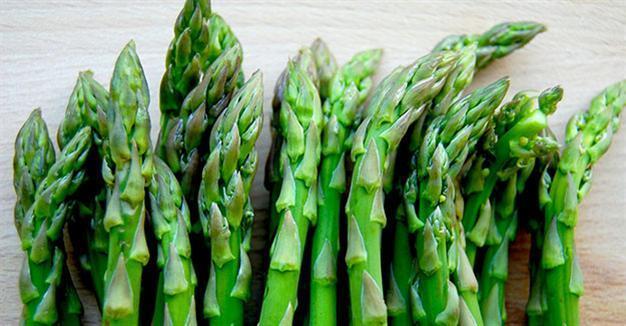Emperors, kings, sultans…
Aylin Öney Tan - aylinoneytan@yahoo.com
 Royalty is about having high tastes, but sometimes the blue-blooded also enjoy things popular with common people. One thing they share with the masses is often not known: Asparagus. Throughout the Mediterranean basin, from Spain to Turkey, peasants and the poor forage for the wild variety every spring; horses and cattle like to graze on it from Poland to Siberia. This spring delicacy is equally enjoyed by all, but with a class difference. The better off enjoy the luxurious cultivated vegetable while the less privileged settle for the wild shoots, but in general perception the sprout remains a bourgeoning taste of the bourgeois.
Royalty is about having high tastes, but sometimes the blue-blooded also enjoy things popular with common people. One thing they share with the masses is often not known: Asparagus. Throughout the Mediterranean basin, from Spain to Turkey, peasants and the poor forage for the wild variety every spring; horses and cattle like to graze on it from Poland to Siberia. This spring delicacy is equally enjoyed by all, but with a class difference. The better off enjoy the luxurious cultivated vegetable while the less privileged settle for the wild shoots, but in general perception the sprout remains a bourgeoning taste of the bourgeois. History records that sovereignty and asparagus go hand in hand. King Louis XIV had special green houses built for growing it in the gardens of Versailles; it was a favorite of French haute cuisine, often regarded as the “King of Vegetables,” or even more appropriately, the “Vegetable of Kings.” Long before the French, it was appreciated in both the ancient Egypt and Roman dynasties. Emperor Augustus had an “Asparagus Fleet” for reaping the young shoots. It is not hard to imagine that Caesar and Cleopatra might have had a feast on asparagus, especially given the fact that aphrodisiac qualities are often attributed to the sprout. Caesar is said to have had a fondness for it, with an added touch of a few drops of rose oil. Maybe it was pure sophistication, or an attempt to overcome the aftermath effects of savoring the delicate sprout. Whoever eats asparagus must know the next pee is notoriously foul smelling. Some are lucky not to notice it as they cannot detect the smell, but some are overly sensitive to asparagine, the element that is contained in asparagus that makes our visit to the bathroom an unpleasant experience. Well, even that is the telltale of the beneficial effects of the vegetable: It is highly diuretic and a good detox food.
Asparagus is called kuşkonmaz in Turkish, meaning “bird cannot perch,” which is actually true as the branches of the plant are so light and feather-like that no bird can nestle on one. The name strangely reminds of the British colloquial term sparrowgrass, which is derived from the original Persian word asparag or sparag. In Turkey, wild asparagus is a popular spring delicacy, often enjoyed simply sautéed with scrambled eggs. One of the first records of kuşkonmaz in a Turkish text dates back to the 1420’s in the medical treatise “Yadigar.” It became a usual menu item in the sultan’s table in the 19th century. Mustafa Kemal Atatürk, the founder of Turkey, was also fond of asparagus. He especially took care to include it in diplomatic banquets. When Prince Gustav of Sweden visited Turkey in 1934, the menu was meticulously arranged to fit both Swedish and Turkish tastes; one dish which seemed to appeal to both sides was the asparagus. Actually Atatürk was instrumental in establishing the first asparagus farm in the western province of Yalova as an initiative of German-Turkish collaboration.
Now, years later, another initiative is sprouting in the northwestern province of Eskişehir, on the banks of the Sakarya River. The idea came upon Arman Badur, who first started to cultivate chicory, later scouring Anatolia to find a terroir suitable to grow asparagus and starting a farm with his childhood friend Murat Şenbuz. Their asparagus brand named NOMAD, aims at a high end product, like in FarmVille, the real-time farm simulation game, where asparagus is a target hard to achieve and only accessible at the 37th level. NOMAD has already reached that target; they are playing hard and high, their sprouts are definitely fit for kings and sultans!
Bite of the Week
Fork of the Week: Throughout April the Grand Tarabya Hotel has a special asparagus menu by chef Selçuk Gönen. When it comes to asparagus, I always like the classics, whether it is a creamy soup, or a nicely baked, cheese-laden quiche. This menu delivers both classics and more daring tastes, like white asparagus sorbet or panna-cotta.
Cork of the Week: Together with our asparagus feast we enjoyed an almost savory Cataratto-Viognier coupage from the Yanık Ülke (literally Burnt Land) winery near Kula in the Aegean province of Manisa. Like asparagus, this wine gets its tastes from the soil, the mineral notes with a lemony accent comes from the volcanic soil where the Sicilian Cataratto grape fits perfectly with the volcanic terrain of the Aegean hills.












